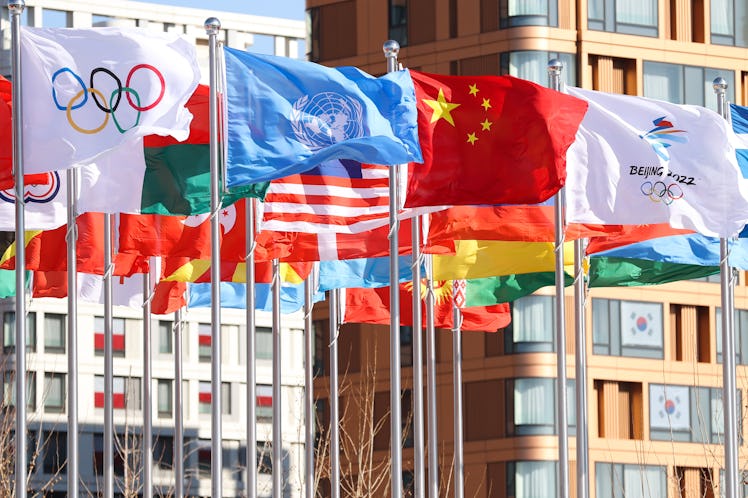
The Lyrics to China's National Anthem Include So Much Historical Meaning
The lyrics are actually pretty intense.
China has around 3,500 years of written history under its belt — and as a country, its national anthems are a huge part of that history. As the host country for the 2022 Winter Olympics, China’s national anthem will be broadcast to millions of people across the world. So, what are the lyrics to China’s current national anthem, and what do they mean? Here are a few interesting historical facts about the songs’ cultural and political significance.
Titled “March of the Volunteers,” China’s current national anthem was first written as a two-stanza poem by the communist playwright, Tian Han, in 1934, per Classical FM. As a song, it also goes by a few other names, including just “The Chinese National Song.” While the poem has multiple translations in English, Classical FM translates the lyrics as: Stand up! Those who refuse to be slaves! / With our flesh and blood, let's build our newest Great Wall! / The Chinese Nation is at its greatest peril, / Each one is forced to let out one last roar. / Stand up! Stand up! Stand up! / We are billions of one heart, / Braving the enemies' fire, March on! / Braving the enemies' fire, March on! / March on! March on! On!
The lyrics were adapted to fit a musical melody by composers Nie Er and Aaron Avshalomov for the communist-aligned film, Children of Troubled Times, released in 1935. However, before the song was officially adopted as the country’s anthem in 1978, it evolved into a military song that Chinese soldiers sang during the Second Sino-Japanese War from 1937 to 1945, and became the unofficial anthem when China’s communist party took power in 1949.
Now in 2022, the country has some pretty strict laws surrounding the national anthem: In 2017, the nation made it illegal to disrespect the Chinese national anthem. According to Reuters, violators could face up to 15 days in police detention. Chinese government officials have also stated that, during the 2022 Winter Olympics, any athlete behavior going against Chinese laws will lead to consequences. “Any expression that is in line with the Olympic spirit I’m sure will be protected,” said Yang Shu, the deputy director of international relations for the Beijing organizing committee, during a Jan. 18 press conference. “Any behavior or speech that is against the Olympic spirit, especially against the Chinese laws and regulations, are also subject to certain punishment.”
And those aren’t the only strict laws involving disrespect — there’s been plenty of buzz surrounding China’s alleged human rights abuses against the Uyghur community in the country’s northwestern region, especially since the United States and several other countries have announced they were participating in a diplomatic boycott against this year’s games. In a June 2021 statement, Chinese officials denied the allegations of human rights violations and genocide against the Uyghurs, calling the international accusations the “lie of the century.”
Meanwhile, the 2022 Winter Games in Beijing are also facing heavy criticism for continuing amid the ongoing COVID-19 pandemic — there have been multiple reports of the highly contagious Omicron variant spreading across China, and people all over the world are questioning the country’s ability to contain infection rates. So while the Olympics are indeed a chance to celebrate unity through sportsmanship, it’s important to remember how history still affects the present.